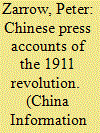| Srl | Item |
| 1 |
ID:
034417


|
|
|
|
|
| Publication |
New York, Columbia University Press, 1990.
|
| Description |
xi, 343p.
|
| Series |
Studies of the East Asian Institute
|
| Standard Number |
0231071388
|
|
|
|
|
|
|
|
|
|
|
|
Copies: C:1/I:0,R:0,Q:0
Circulation
| Accession# | Call# | Current Location | Status | Policy | Location |
| 032671 | 320.570951/ZAR 032671 | Main | On Shelf | General | |
|
|
|
|
| 2 |
ID:
110143


|
|
|
|
|
| Publication |
2011.
|
| Summary/Abstract |
By examining how a particular story of events from October 1911 through to the abdication of the Qing imperial house in February 1912 was constructed, it is possible to suggest the effects of that story both as events unfolded and on subsequent historical consciousness. This article examines the coverage of the revolution in two newspapers, Shenbao, founded in Shanghai in 1872, and Dagongbao, founded in Tianjin in 1902. They were not necessarily representative of the press as a whole, much less public opinion, but they demonstrate different versions of the same essential narrative. The Shenbao story of '1911' told of struggle and triumph, culminating in the election of Sun Yat-sen as provisional president on 1 January 1912, which marked the founding of the republic. Dagongbao lacked triumphalism and was almost tragic in its reading of the revolution. Nonetheless, Dagongbao as much as Shenbao was quick to present a story of the transformation of 'chaos' into 'revolution' and finally into the republic (with the imperial abdication of 12 February). Both newspapers traced the revolution from the Wuchang Uprising, and the resulting narrative structure divided political time into before and after. That division is probably the essence of 'revolution'.
|
|
|
|
|
|
|
|
|
|
|
|
|
|
|
|